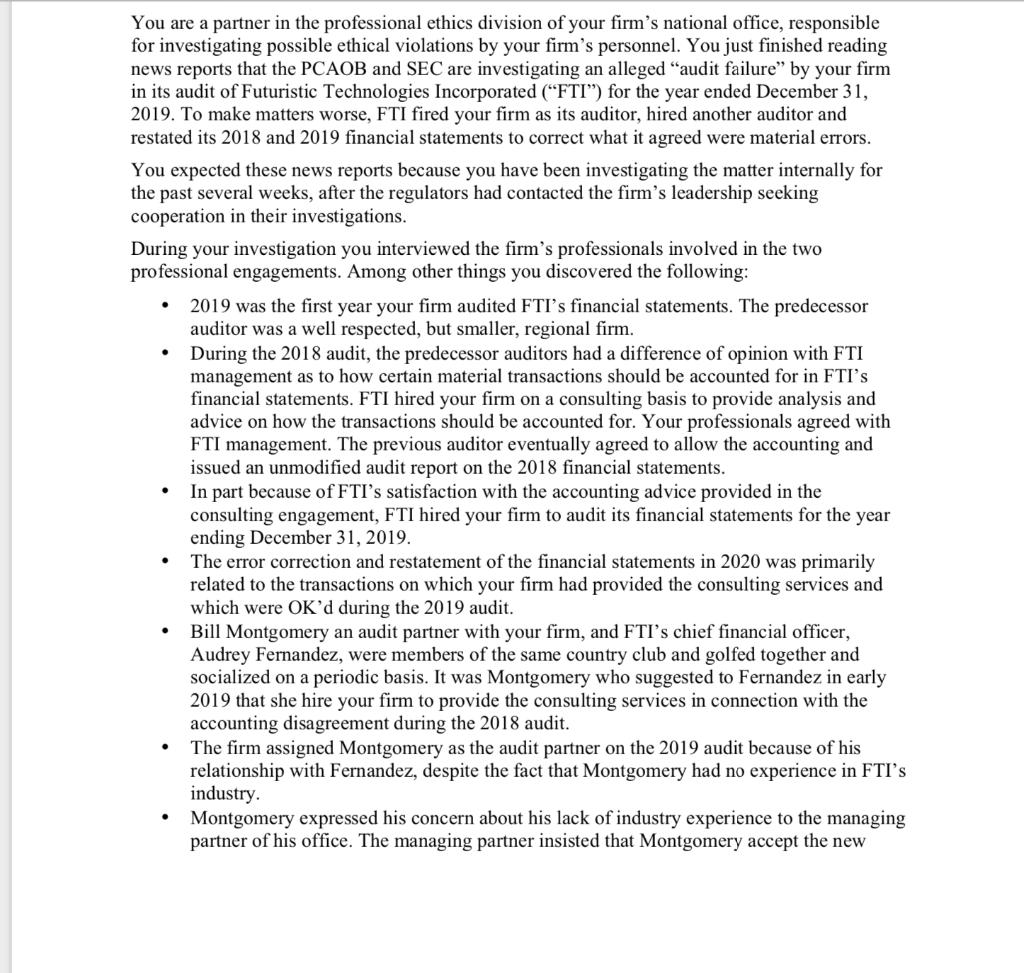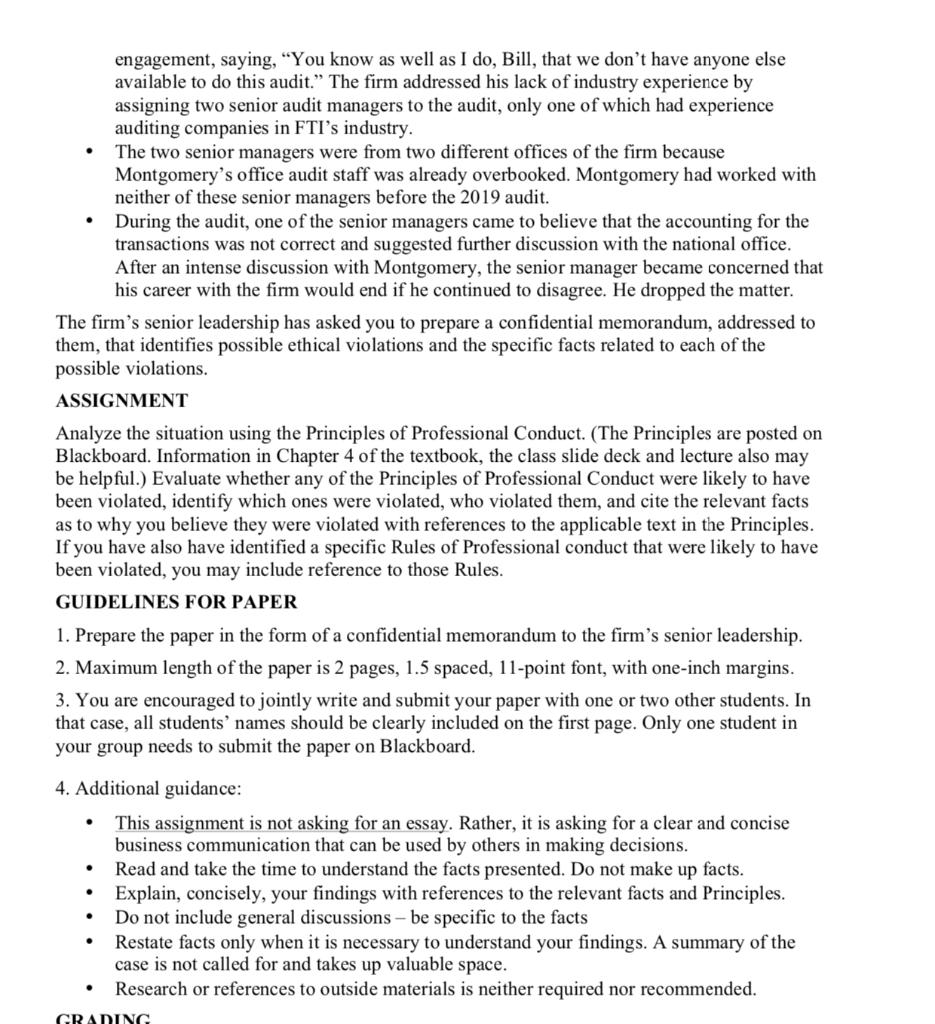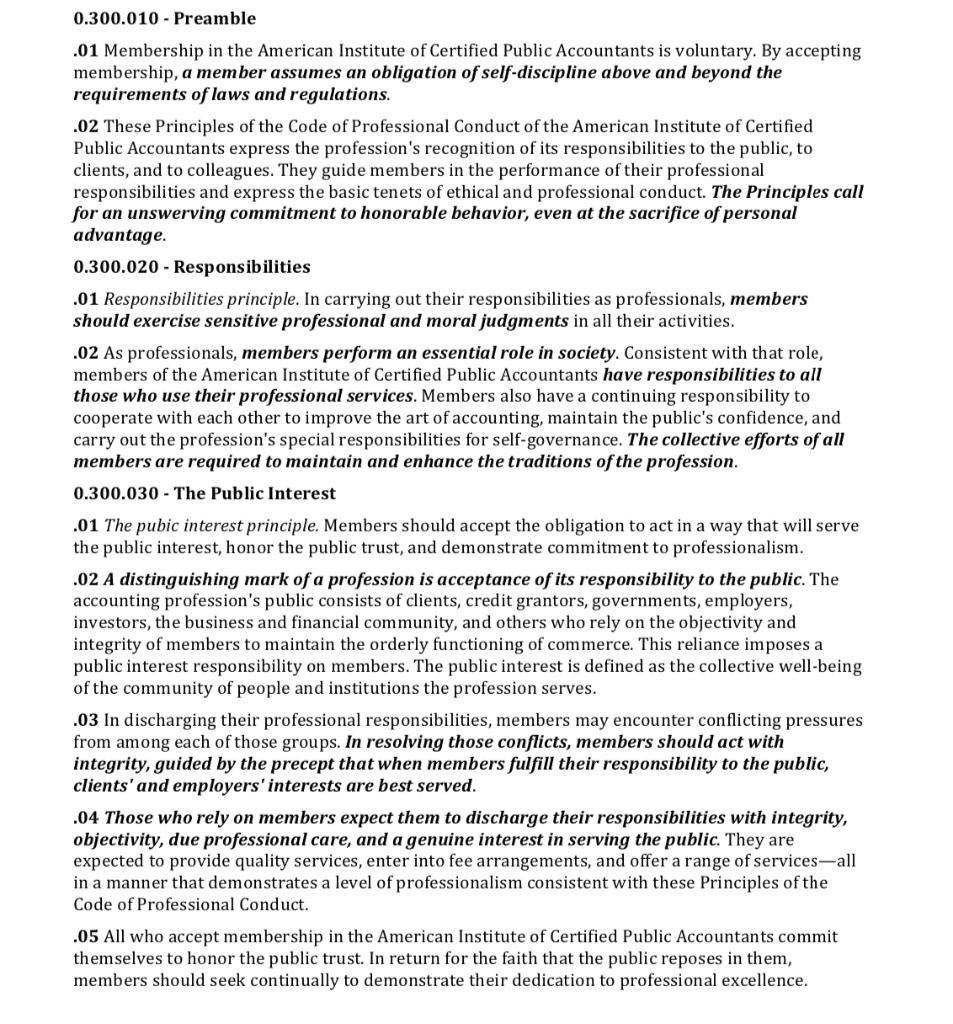You are a partner in the professional ethics division of your firm's national office, responsible for investigating possible ethical violations by your firm's personnel.



You are a partner in the professional ethics division of your firm's national office, responsible for investigating possible ethical violations by your firm's personnel. You just finished reading news reports that the PCAOB and SEC are investigating an alleged "audit failure" by your firm in its audit of Futuristic Technologies Incorporated ("FTI") for the year ended December 31, 2019. To make matters worse, FTI fired your firm as its auditor, hired another auditor and restated its 2018 and 2019 financial statements to correct what it agreed were material errors. You expected these news reports because you have been investigating the matter internally for the past several weeks, after the regulators had contacted the firm's leadership seeking cooperation in their investigations. During your investigation you interviewed the firm's professionals involved in the two professional engagements. Among other things you discovered the following: 2019 was the first year your firm audited FTI's financial statements. The predecessor auditor was a well respected, but smaller, regional firm. During the 2018 audit, the predecessor auditors had a difference of opinion with FTI management as to how certain material transactions should be accounted for in FTI's financial statements. FTI hired your firm on a consulting basis to provide analysis and advice on how the transactions should be accounted for. Your professionals agreed with FTI management. The previous auditor eventually agreed to allow the accounting and issued an unmodified audit report on the 2018 financial statements. In part because of FTI's satisfaction with the accounting advice provided in the consulting engagement, FTI hired your firm to audit its financial statements for the year ending December 31, 2019. The error correction and restatement of the financial statements in 2020 was primarily related to the transactions on which your firm had provided the consulting services and which were OK'd during the 2019 audit. Bill Montgomery an audit partner with your firm, and FTI's chief financial officer, Audrey Fernandez, were members of the same country club and golfed together and socialized on a periodic basis. It was Montgomery who suggested to Fernandez in early 2019 that she hire your firm to provide the consulting services in connection with the accounting disagreement during the 2018 audit. The firm assigned Montgomery as the audit partner on the 2019 audit because of his relationship with Fernandez, despite the fact that Montgomery had no experience in FTI's industry. Montgomery expressed his concern about his lack of industry experience to the managing partner of his office. The managing partner insisted that Montgomery accept the new engagement, saying, "You know as well as I do, Bill, that we don't have anyone else available to do this audit." The firm addressed his lack of industry experience by assigning two senior audit managers to the audit, only one of which had experience auditing companies in FTI's industry. The two senior managers were from two different offices of the firm because Montgomery's office audit staff was already overbooked. Montgomery had worked with neither of these senior managers before the 2019 audit. During the audit, one of the senior managers came to believe that the accounting for the transactions was not correct and suggested further discussion with the national office. After an intense discussion with Montgomery, the senior manager became concerned that his career with the firm would end if he continued to disagree. He dropped the matter. The firm's senior leadership has asked you to prepare a confidential memorandum, addressed to them, that identifies possible ethical violations and the specific facts related to each of the possible violations. ASSIGNMENT Analyze the situation using the Principles of Professional Conduct. (The Principles are posted on Blackboard. Information in Chapter 4 of the textbook, the class slide deck and lecture also may be helpful.) Evaluate whether any of the Principles of Professional Conduct were likely to have been violated, identify which ones were violated, who violated them, and cite the relevant facts as to why you believe they were violated with references to the applicable text in the Principles. If you have also have identified a specific Rules of Professional conduct that were likely to have been violated, you may include reference to those Rules. GUIDELINES FOR PAPER 1. Prepare the paper in the form of a confidential memorandum to the firm's senior leadership. 2. Maximum length of the paper is 2 pages, 1.5 spaced, 11-point font, with one-inch margins. 3. You are encouraged to jointly write and submit your paper with one or two other students. In that case, all students' names should be clearly included on the first page. Only one student in your group needs to submit the paper on Blackboard. 4. Additional guidance: This assignment is not asking for an essay. Rather, it is asking for a clear and concise business communication that can be used by others in making decisions. Read and take the time to understand the facts presented. Do not make up facts. Explain, concisely, your findings with references to the relevant facts and Principles. Do not include general discussions - be specific to the facts Restate facts only when it is necessary to understand your findings. A summary of the case is not called for and takes up valuable space. Research or references to outside materials is neither required nor recommended. GRADING 0.300.010 - Preamble .01 Membership in the American Institute of Certified Public Accountants is voluntary. By accepting membership, a member assumes an obligation of self-discipline above and beyond the requirements of laws and regulations. .02 These Principles of the Code of Professional Conduct of the American Institute of Certified Public Accountants express the profession's recognition of its responsibilities to the public, to clients, and to colleagues. They guide members in the performance of their professional responsibilities and express the basic tenets of ethical and professional conduct. The Principles call for an unswerving commitment to honorable behavior, even at the sacrifice of personal advantage. 0.300.020 - Responsibilities .01 Responsibilities principle. In carrying out their responsibilities as professionals, members should exercise sensitive professional and moral judgments in all their activities. .02 As professionals, members perform an essential role in society. Consistent with that role, members of the American Institute of Certified Public Accountants have responsibilities to all those who use their professional services. Members also have a continuing responsibility to cooperate with each other to improve the art of accounting, maintain the public's confidence, and carry out the profession's special responsibilities for self-governance. The collective efforts of all members are required to maintain and enhance the traditions of the profession. 0.300.030 - The Public Interest .01 The pubic interest principle. Members should accept the obligation to act in a way that will serve the public interest, honor the public trust, and demonstrate commitment to professionalism. .02 A distinguishing mark of a profession is acceptance of its responsibility to the public. The accounting profession's public consists of clients, credit grantors, governments, employers, investors, the business and financial community, and others who rely on the objectivity and integrity of members to maintain the orderly functioning of commerce. This reliance imposes a public interest responsibility on members. The public interest is defined as the collective well-being of the community of people and institutions the profession serves. .03 In discharging their professional responsibilities, members may encounter conflicting pressures from among each of those groups. In resolving those conflicts, members should act with integrity, guided by the precept that when members fulfill their responsibility to the public, clients' and employers' interests are best served. .04 Those who rely on members expect them to discharge their responsibilities with integrity, objectivity, due professional care, and a genuine interest in serving the public. They are expected to provide quality services, enter into fee arrangements, and offer a range of services-all in a manner that demonstrates a level of professionalism consistent with these Principles of the Code of Professional Conduct. .05 All who accept membership in the American Institute of Certified Public Accountants commit themselves to honor the public trust. In return for the faith that the public reposes in them, members should seek continually to demonstrate their dedication to professional excellence. You are a partner in the professional ethics division of your firm's national office, responsible for investigating possible ethical violations by your firm's personnel. You just finished reading news reports that the PCAOB and SEC are investigating an alleged "audit failure" by your firm in its audit of Futuristic Technologies Incorporated ("FTI") for the year ended December 31, 2019. To make matters worse, FTI fired your firm as its auditor, hired another auditor and restated its 2018 and 2019 financial statements to correct what it agreed were material errors. You expected these news reports because you have been investigating the matter internally for the past several weeks, after the regulators had contacted the firm's leadership seeking cooperation in their investigations. During your investigation you interviewed the firm's professionals involved in the two professional engagements. Among other things you discovered the following: 2019 was the first year your firm audited FTI's financial statements. The predecessor auditor was a well respected, but smaller, regional firm. During the 2018 audit, the predecessor auditors had a difference of opinion with FTI management as to how certain material transactions should be accounted for in FTI's financial statements. FTI hired your firm on a consulting basis to provide analysis and advice on how the transactions should be accounted for. Your professionals agreed with FTI management. The previous auditor eventually agreed to allow the accounting and issued an unmodified audit report on the 2018 financial statements. In part because of FTI's satisfaction with the accounting advice provided in the consulting engagement, FTI hired your firm to audit its financial statements for the year ending December 31, 2019. The error correction and restatement of the financial statements in 2020 was primarily related to the transactions on which your firm had provided the consulting services and which were OK'd during the 2019 audit. Bill Montgomery an audit partner with your firm, and FTI's chief financial officer, Audrey Fernandez, were members of the same country club and golfed together and socialized on a periodic basis. It was Montgomery who suggested to Fernandez in early 2019 that she hire your firm to provide the consulting services in connection with the accounting disagreement during the 2018 audit. The firm assigned Montgomery as the audit partner on the 2019 audit because of his relationship with Fernandez, despite the fact that Montgomery had no experience in FTI's industry. Montgomery expressed his concern about his lack of industry experience to the managing partner of his office. The managing partner insisted that Montgomery accept the new engagement, saying, "You know as well as I do, Bill, that we don't have anyone else available to do this audit." The firm addressed his lack of industry experience by assigning two senior audit managers to the audit, only one of which had experience auditing companies in FTI's industry. The two senior managers were from two different offices of the firm because Montgomery's office audit staff was already overbooked. Montgomery had worked with neither of these senior managers before the 2019 audit. During the audit, one of the senior managers came to believe that the accounting for the transactions was not correct and suggested further discussion with the national office. After an intense discussion with Montgomery, the senior manager became concerned that his career with the firm would end if he continued to disagree. He dropped the matter. The firm's senior leadership has asked you to prepare a confidential memorandum, addressed to them, that identifies possible ethical violations and the specific facts related to each of the possible violations. ASSIGNMENT Analyze the situation using the Principles of Professional Conduct. (The Principles are posted on Blackboard. Information in Chapter 4 of the textbook, the class slide deck and lecture also may be helpful.) Evaluate whether any of the Principles of Professional Conduct were likely to have been violated, identify which ones were violated, who violated them, and cite the relevant facts as to why you believe they were violated with references to the applicable text in the Principles. If you have also have identified a specific Rules of Professional conduct that were likely to have been violated, you may include reference to those Rules. GUIDELINES FOR PAPER 1. Prepare the paper in the form of a confidential memorandum to the firm's senior leadership. 2. Maximum length of the paper is 2 pages, 1.5 spaced, 11-point font, with one-inch margins. 3. You are encouraged to jointly write and submit your paper with one or two other students. In that case, all students' names should be clearly included on the first page. Only one student in your group needs to submit the paper on Blackboard. 4. Additional guidance: This assignment is not asking for an essay. Rather, it is asking for a clear and concise business communication that can be used by others in making decisions. Read and take the time to understand the facts presented. Do not make up facts. Explain, concisely, your findings with references to the relevant facts and Principles. Do not include general discussions - be specific to the facts Restate facts only when it is necessary to understand your findings. A summary of the case is not called for and takes up valuable space. Research or references to outside materials is neither required nor recommended. GRADING 0.300.010 - Preamble .01 Membership in the American Institute of Certified Public Accountants is voluntary. By accepting membership, a member assumes an obligation of self-discipline above and beyond the requirements of laws and regulations. .02 These Principles of the Code of Professional Conduct of the American Institute of Certified Public Accountants express the profession's recognition of its responsibilities to the public, to clients, and to colleagues. They guide members in the performance of their professional responsibilities and express the basic tenets of ethical and professional conduct. The Principles call for an unswerving commitment to honorable behavior, even at the sacrifice of personal advantage. 0.300.020 - Responsibilities .01 Responsibilities principle. In carrying out their responsibilities as professionals, members should exercise sensitive professional and moral judgments in all their activities. .02 As professionals, members perform an essential role in society. Consistent with that role, members of the American Institute of Certified Public Accountants have responsibilities to all those who use their professional services. Members also have a continuing responsibility to cooperate with each other to improve the art of accounting, maintain the public's confidence, and carry out the profession's special responsibilities for self-governance. The collective efforts of all members are required to maintain and enhance the traditions of the profession. 0.300.030 - The Public Interest .01 The pubic interest principle. Members should accept the obligation to act in a way that will serve the public interest, honor the public trust, and demonstrate commitment to professionalism. .02 A distinguishing mark of a profession is acceptance of its responsibility to the public. The accounting profession's public consists of clients, credit grantors, governments, employers, investors, the business and financial community, and others who rely on the objectivity and integrity of members to maintain the orderly functioning of commerce. This reliance imposes a public interest responsibility on members. The public interest is defined as the collective well-being of the community of people and institutions the profession serves. .03 In discharging their professional responsibilities, members may encounter conflicting pressures from among each of those groups. In resolving those conflicts, members should act with integrity, guided by the precept that when members fulfill their responsibility to the public, clients' and employers' interests are best served. .04 Those who rely on members expect them to discharge their responsibilities with integrity, objectivity, due professional care, and a genuine interest in serving the public. They are expected to provide quality services, enter into fee arrangements, and offer a range of services-all in a manner that demonstrates a level of professionalism consistent with these Principles of the Code of Professional Conduct. .05 All who accept membership in the American Institute of Certified Public Accountants commit themselves to honor the public trust. In return for the faith that the public reposes in them, members should seek continually to demonstrate their dedication to professional excellence.
Step by Step Solution
3.52 Rating (155 Votes )
There are 3 Steps involved in it
Step: 1
Background and Analysis of the situation As a partner in thr professional ethics division of the firms national office the responsibility is given to me to investigating possible ethical violations Th...
See step-by-step solutions with expert insights and AI powered tools for academic success
Step: 2

Step: 3

Ace Your Homework with AI
Get the answers you need in no time with our AI-driven, step-by-step assistance
Get Started


